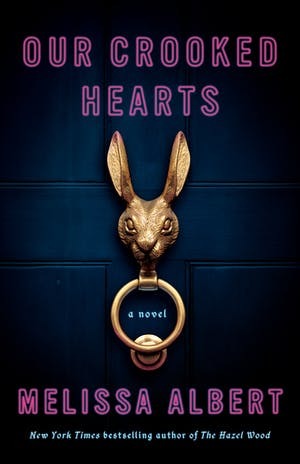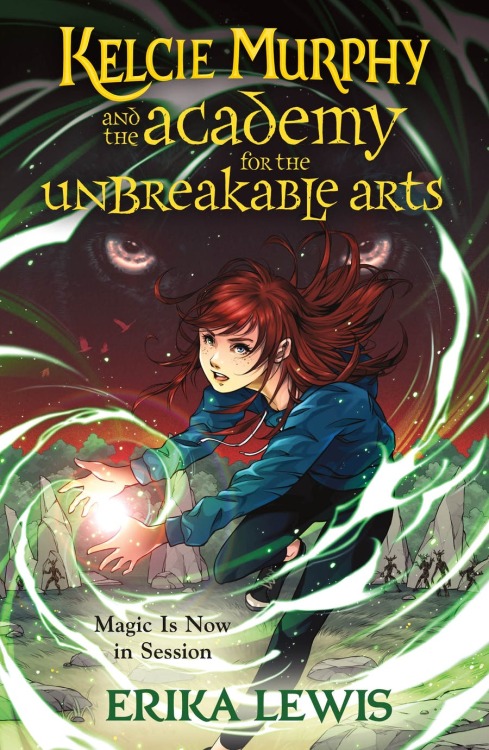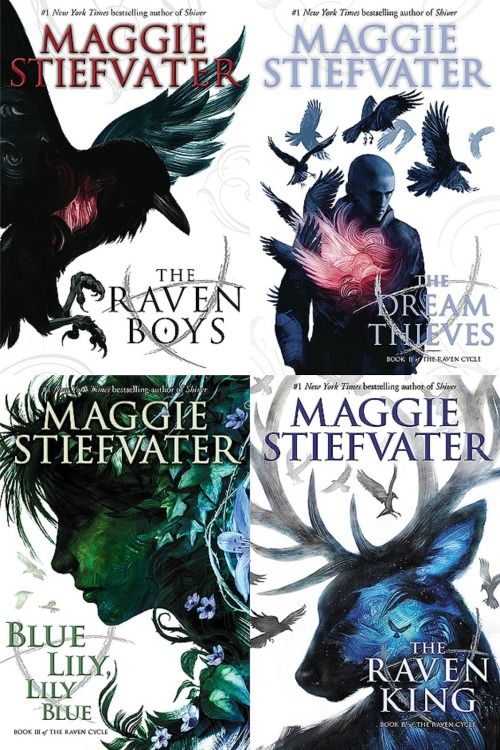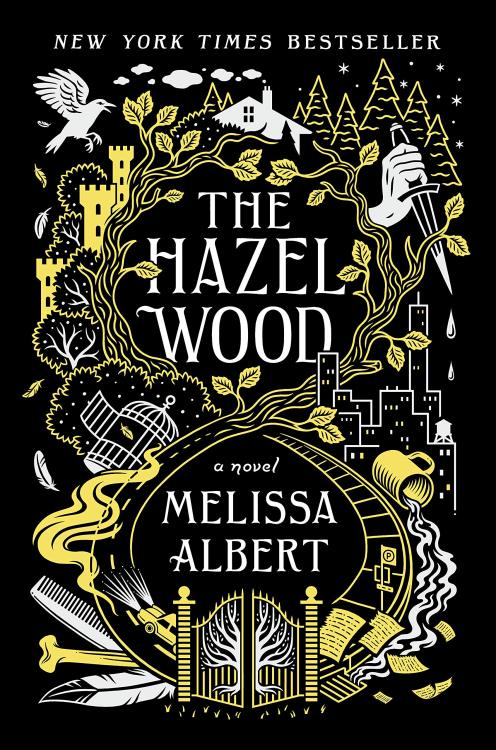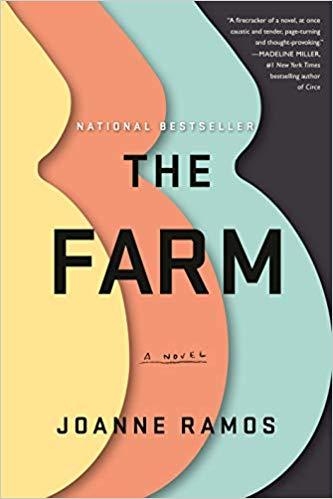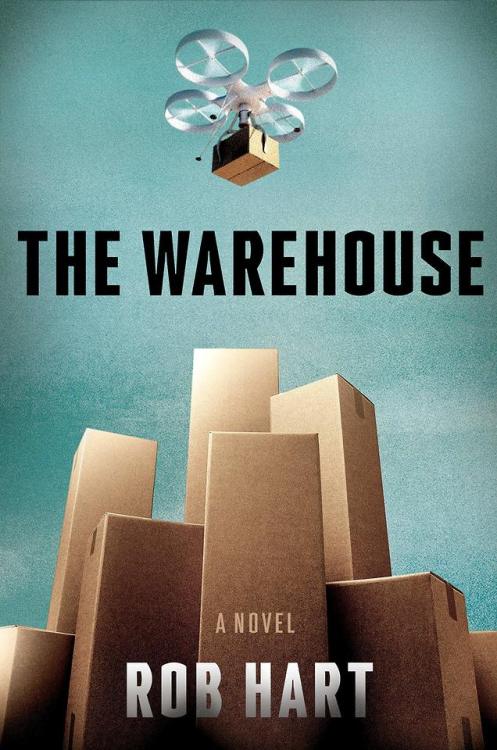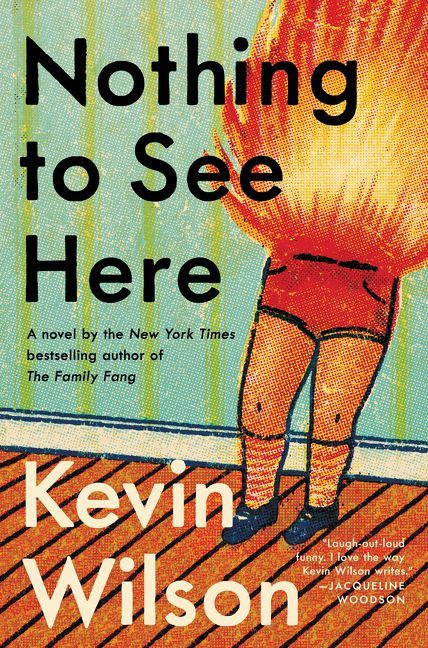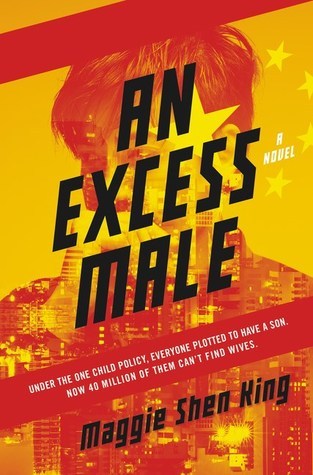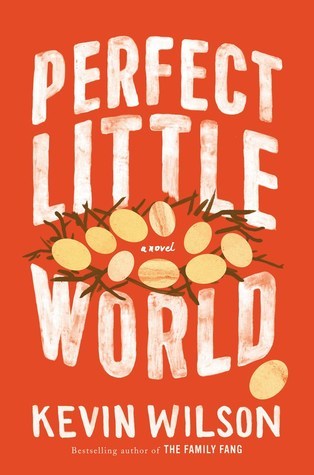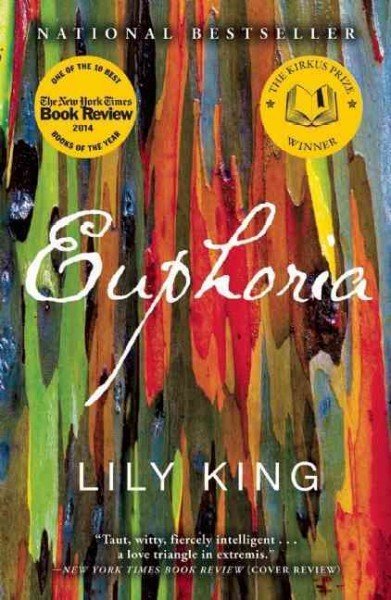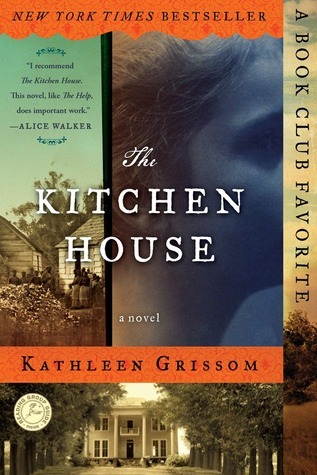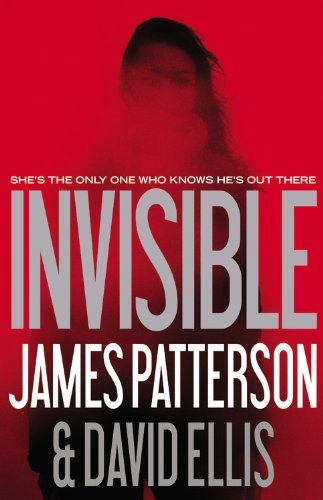#page turner
Red Queen by Victoria Aveyard
Spoiler Alert: A single moment changes Mare’s life forever, forcing her to parade around like the Silver-blooded princess she is not. She must walk the thin edge of a knife, never faltering for a second, for her life now depends on it.
Our Crooked Hearts
By Melissa Albert
Melissa Albert terrifies and inspires me in equal measure.
Her books have an otherworldly quality that gives you the sense that as you read them you are changing - or the world around you is changing, or perhaps, being revealed for what it truly is - and if you don’t stop, things will never be the same. Our Crooked Hearts is no exception.
I read Our Crooked Hearts late into the night while peering over my pages to make sure nothing was lurking in the shadows. Unspooling in dual narratives of a mother and daughter during their tumultuous teenage years as they discover themselves and their magic, Albert renders a world of misshapen motherhood, flailing youth, forging friendships, and just-this-side of possible witchcraft.
But if we’ve learned anything from The Hazel Wood, it’s that nothing is free. What I love most about Albert’s work is that there is nothing gratuitous or excessive. She manages to conjure fear, terror, sadness and rage - and it all serves a purpose. The characters are all flawed and flailing but not feckless; they strive to protect, to learn, to rectify, to save. This is evident in the conclusion of the book, which I won’t spoil for you here, but what I will share is wholly satisfying and positively positive. Yes, amidst a book that is terror incarnate, there is, dare I say, somehow, hope.
What is also remarkable about Albert is her ability to wield the written word. She is not only writing, she is crafting a new language. Her prose is like if Neil Gaiman and Maggie Stiefvater had a baby and it were raised by Patti Smith. She crashes words together and creates the most unlikely metaphors that make so much sense it hurts. She writes with the angst of a teenager but the wisdom of a beat poet and the heart of a goddess who still loves humanity. Her text is so palpable that in reading it, I feel like I am participating in a secret ritual that may in fact conjure actual magic. Her writing is the stuff of future lore, of fractured spells, of midnight swims in moon-bleeding waters. She is inventing a story and a form - and it’s the perfect love letter scrawled in black magic for the raging teen trapped inside of us all.
Post link
Kelcie Murphy and the Academy for the Unbreakable Arts
by Erika Lewis
What if Slytherin had claimed Harry Potter? This is the world of Kelcie Murphy and the Academy for the Unbreakable Arts. What starts as a typically human tale of a museum field trip with a thick-skinned Bostonian foster child transmogrifies into a magical and possibly sinister trial-of-skill in the Celtic realm of fae and fury.
Kelcie Murphy remembers nothing of her childhood. Shuffled between foster homes in the bitter northeast, her only connection to her life before is the curious pendant strung around her neck. When she is carted away by authorities during a school field trip, she discovers an artifact that is not on display - and for good reason. It’s possible that while wrestling with freezing fae and her understanding of reality in the bowels of the museum, she may have been tricked into incanting a spell that opens a kind of eye of Sauron situation and names her as an heir to a frightening, perhaps world-annihilating power.
Thus she is transported to the Otherworld. Which it turns out, is her true home. On the hunt for her parents, she discovers that she may actually have some powers of her own. But to stay in this world, she first has to get into the Academy of Unbreakable Arts.
With school dens, a whole new magical system and a world steeped in Celtic lore, this is the type of book we need right now: fun, transporting and fantastic.
Run, don’t walk, to get this delightful new magical middle grade debut which will appeal to YA fans and a crossover audience as well! I can’t wait for book 2!
Post link
The Raven Cycle
(The Raven Boys, The Dream Thieves, Blue Lily, Lily Blue, The Raven King & Opal)
By Maggie Stiefvater
I was reluctant to read a book about a group of boys, but the dream elements in The Raven Cycle echoed some of the themes in my own book so I decided it would be valuable research. I tend to eschew male protagonists because I surfeited on a diet of them growing up when I longed to read about intelligent, daring, creative women.
ButThe Raven Cycle not only boasts a menagerie of multidimensional nuanced male characters, but also fierce, dynamic, wild females as well. I am so glad that Maggie Stiefvater lured me in with her brilliant premise, lyrical prose and unexpected landscape so that I could appreciate this gorgeous gritty tapestry of teen male kinship (and dare I say the sensuality of cars?) through not just a trilogy, but a quartet of books - plus a bonus short story. Oh, and for all of us that curse the end of a good series, guess what? There is a spin-off called The Dreamer Trilogy which I am enjoying now narrated by the brilliantly pliant Will Patten.
Blue Sergeant chronicles the names of the dead as the pass on the ley line each year. A seemingly ungifted seer in a house of talented female clairvoyants, Blue never seems to “see” anything until she sees the ghost of Gansey. This encounter catapults Blue into an adventure with a group of misfit prep school boys in search of a legend king.
With the kind of grand reveals that make a reader do a double take, Stiefvater builds a wholly unique world full of fantastical nightmares and earnest possibility that exists just a stumble away from our own.
Written with the intelligence of an adult but the poetry and wisdom that we lose as we age, this southern gothic tarot phantasm has the imagination of Erin Morgenstern and the dark possible magic of Melissa Albert’s The Hazel Wood.
So, let’s hear it for the boys, and for an author who has rendered such vivid multidimensional heroes - and heroines - to add to the canon of YA literature.
Post link
The Hazel Wood & The Night Country
By Melissa Albert
The Hazel Wood and its sequel, The Night Country, are stories I almost wish I could experience again for the first time. An exploration of the fairytale underworld, the tales follow Alice, a beleaguered, haunted teenager, as she lives a piece-meal life, constantly moving cross-country with her mom. The duo flees makeshift homes regularly, with bad luck always nipping at their heels.
Though Alice and her mom live modestly, Alice’s grandmother is world-renowned, the author of a sublimely notorious and equally hard-to-find compendium of fairy tales. After receiving word that the estranged grandmother has died, mother and daughter finally settle in NYC, sighing with relief that their bad luck is behind them. Finally, Alice has a chance at a normal life.
But then, Alice’s mom goes missing and all clues point to the grandmother’s mansion, and beyond - to the morbid world of her concocted fairytales, tales that are starting to materialize on the streets of NY.
The Hazel Wood is a gritty Brothers’ Grimm bumming a cigarette, a jaded teenager stuck on the dark side of a NYC daydream, a haunted subway ride. It’s the stuff of nightmares but more gruesome and modern than Grimm. Imbued with young adult emo, it is also surprisingly poetic - much like our teenage years.
The Night Country follows in its footsteps, imagining a world that would make Mary Shelly shiver. Albert’s world is a fanatical escape for these dark times if you want to get away and indulge simultaneously. And for those hungry for more of Albert’s macabre marvels, the actual book of grandmother’s fairytales is slated to be released this winter. A book within a book. How apropos for a tale like this… Just take care you can separate story from reality. Fairytales are, after all, only make believe… aren’t they?
Post link
The Farm
by Joanne Ramos
At one day past my due date, I am currently in either the best or the worst position to review Joanne Ramos’ thought-provoking page-turner The Farm.
At the moment, the slightly-too-plausible premise of farming out pregnancies via pricey surrogacy does not seem so bad. Having endured morning sickness occurring all times of day that does not cease after 1st trimester, exhaustion tantamount to being hit repeatedly by a bus, never-ending constipation and pains in places I didn’t know existed, might I hire someone to trade places? Tell me where to VENMO.
And yet, in a way, this isn’t even what The Farm is about. The bookstore employee suggested it was like The Handmaid’s Tale, perhaps in an effort to warn my obviously gestating self that it might not be the best time to read it. In fact, it is only really like The Handmaid’s Tale in that there are pregnant women at its center.
It’s also not about the price of motherhood, the high-achieving women who are penalized at work for having children, nor about the fact that the US is the only developed country without paid maternity leave. These topics could have doubled the size of the book - and I would have gladly read more.
WhatThe Farm is about is far more personal and insidious - a sort of collective history and culpability woven into the fabric of the American flag - Betsy Ross stitching in her trinity kitchen all the while going blind.
The story follows Jane, a young Fiipina mother, trying to survive in NY. Her cousin presents her with an opportunity: interview at Golden Oaks, a resort-style surrogate facility, where the wealthiest clients pay top dollar to outsource their pregnancies. The facility provides comprehensive nutrition, weekly prenatal massages, yoga, wellness tracking and …alpacas. There she meets Reagan and Lisa, two caucasian “hosts,” who pull her into their orbit. With the payouts for healthy babies so huge, each “host” has her own reasons for signing up for 10 (yes, look up how long pregnancy actually is) months of incarceration, so to speak.
In addition to a brilliantly-paced speculative fiction thriller, what starts to unfold is a social commentary about opportunity, access, immigration, and skin tone. And by the end of the novel, as Jane marvels at her own brave smart daughter, I start to wonder about the American Dream - who has been duped and who is benefitting from doing the duping. We expect it to pay its dividends in one lifetime. Come “your huddled masses yearning to breathe free” not well,…three generations down the road. And when my own great-grandmother emigrated, gnawed family photo in hand, I wonder if she ever thought about three - and any day now, four - generations down the line, and where her sea voyage would lead.
And perhaps it’s not that the American Dream is dead - perhaps we just always thought it was free. What if it’s always been pricey? And the questions are: how much are you willing to sell?Andhow much are you willing to pay?
Let the bidding begin.
Post link
The Warehouse
by Rob Hart
Blake Crouch told me to read this book.
Ok, not personally, but still.
Initially, I read the first chapter, shrugged and put it down, slightly discouraged by the glossy magazine-sheen styled tone.
Then I received a BookBub email with Blake Crouch’s recommendation to read The Warehouse.
Having just acknowledged in my last B3 post that I might in fact jump off a bridge if the man suggested, I figured it was reasonable to read his book recommendation instead.
Naturally, I finished The Warehouse within a couple days because as the narrators and perspectives switched so did the tone of the book, making it as palatable as a CloudBurger at LivePlay. But I’m getting ahead of myself.
Enter a world where The Cloud is king. Naturally, said world has gone to pot: climate change makes temperatures unendurable, unemployment is ubiquitous, water unpotable, meat scarce, and prospects dire for small business. But at The Cloud, with fully stocked shelves of shiny goods, air-conditioned dorm rooms, built-in healthcare and tram cars, not to mention LivePlay entertainment and readily available Cloud Burgers, life is good. Well, not necessarily good, but tolerable. Well, not necessarily tolerable, but air-conditioned.
So what if the shifts are 12 hours long, or there’s a $6 bank transfer charge, or you get docked ratings for not volunteering for extra work time? And so what if the bathrooms are constantly out of order, or the cinderblock rooms are the size of closets or your every move is tracked with a wristband?
The Warehouse is like if The Circle were written about Amazon and Apple combined featuring Steve Jobs and Lisbeth Salander set to an employee training video.
But don’t you enjoy having everything delivered at the click of a button? And for a such a reasonable cost? Have you ever wondered after you click “buy now” who is paying for the deficit?
*B3 received an ARC from Netgalley in exchange for an honest review.
Post link
Recursion
by Blake Crouch
Could Blake Crouch please write more books so I can start a novel and then read until the wee hours of the morning every single night of my life?
For some reason, I keep on thinking, If Blake Crouch told me to jump off a bridge, I just might. Though it’d have nothing to do with peer pressure. I think I’d step off that bridge just because I wouldn’t be surprised if his concept of time, space and reality so far transcends mine that that small time continuum disturbance would save the world in some way.
Crouch is simply a master sci-fi storyteller. Do you love slightly alternative worlds to ours? Check. Love near-plausible catastrophic worldwide scenarios? Check. Love books that blow your mind with their theories? Check.
Recursion starts with a world that is suffering from False Memory Syndrome, a seemingly isolated disease in which people experience “false memories” of a life they never lived while simultaneously living the life they do. This naturally causes many a psychotic break. Because what if you remembered a world where you had a spouse and child and rewarding job and suddenly find yourself single, childless and bankrupt?
I almost don’t know how to write about Recursion because there comes a time while reading Crouch’s books where my meager astrophysical understanding of the world collides with reality to create a fissure through which I can peek into a distinct possibility that he is not the storyteller of a fictional tale, but rather a harbinger of a real impending doom.
I read Dark Matter in one sitting. I opened it at bedtime. I turned the last page before I fell asleep. Recursion I savored over the course of a 24-hour period, though from self-control or fear for our precarious world, I cannot say which.
In some way, Blake Crouch writes the stuff of nightmares: science, power, playing God. The problem is: sometimes it’s hard to tell whether or not we’re awake.
Post link
The Whisper Network
by Chandler Baker
Once I had turned the final page of The Whisper Network, I revisited how the book was categorized. How was this page-turning whodunnit and what was actually done catalogued? Was this a thriller? A piece of literary fiction? A crime novel? Adult fiction? What I found it under was “Women’s Fiction.”
Hm. Then I wondered, is there a “Men’s Fiction” section?
When I started reading the book, I didn’t know what I was getting into, ostensibly a high-functioning office politics drama. But The Whisper Network is delightfully decadent and also so literary that I found myself highlighting passages because they rang so true. This has become more of a rarity in my experience of crime-type dramas and so-called “women’s fiction.” Books of this ilk tend to sacrifice savvy for salaciousness and three-dimensional characters for two-sided arguments. This book does neither. It creates a complex tapestry of the inner workings of a corporation, particularly the legal department - an apt department indeed, considering sexual harassment becomes the topic of debate. Where better to hash it out than amongst the best legal council possible?
And yet, this plot makes the arguments regarding sexual harassment and power in the workplace that much more nuanced. Because if a list were to surface - say, a list of individuals to avoid in your career - would you take it an a gift and sidestep? Or would you see it as an offense against said individuals’ possibly very reputable characters?
And I simply could not put it down. I couldn’t wait to see what happened to our varied heroines as they navigated the muddy waters of their careers. Because in those moments, they were us - waffling, debating, discerning, hashing, taking action, failing, and regretting, - plotting, researching, networking, investigating, reflecting, discovering, raging and triumphing. And so the craftiest bit of the novel is this - a device I cannot recall having seen - or, read. The book shifts regularly to first person plural.
What? the Literary geek in you exclaims.
Yes, “we” are included for whole chapters. And with each “we” it’s possible I’ve been manipulated into reading on and on, or it’s possible “we” includes me in the war so I don’t feel so alone in my own. But in the end, we don’t care one way or another, because just like in life, we don’t feel like there’s anywhere to go but forward.
*B3 received an ARC from Netgalley in exchange for an honest review.
Post link
Nothing to See Here
by Kevin Wilson
Kevin Wilson has done it again. You may remember Kevin Wilson from his darkly comedic Royal Tennenbaums-eque take on the hapless performance art family in The Family Fang. Or perhaps from his alternatively optimistic commune of utopian ideals in A Perfect Little World.
While similar in tenor, imbued with Wilson’s quixotic hopefulness and unexpected chaos, Nothing to See Here is wholly unique in premise and scope.
Lillian, a smart girl from the wrong side of the tracks, fights her way into a privileged prep school where she and her rich roommate, Madison, bond during their first year. Then an infuriating circumstance (which I won’t spoil here) leads to a split. Fast-forward ten years later when Madison, now married to a senator, summons Lillian for an urgent, yet mysterious, job opportunity. Lillian, still stuck in a dead-end life, jumps at the chance and quickly finds herself dousing the flames of the senator’s twin offspring.
Literally.
Because they self-immolate when they get agitated.
Wilson writes in such a way that I simultaneously want to ask him to be my friend and tell him to get out of my head. His commentary sometimes made me laugh out loud in doctors’ office waiting rooms. He describes a spoiled little boy removing toys from a chest: “like clowns from a VW bug, out came so many stuffed animals that I felt like I’d dropped acid.” And on feeling out of place: “I felt like some mermaid who had suddenly grown legs and was now living among the humans.” He expertly describes “bread that cracked open like a geode” that makes me crave a loaf immediately. And then he subversively sneaks in plenty of touching real-life wisdom about things like life, parenthood and meditation: “And I had never thought about it this way, had always assumed that whatever was inside me that made me toxic could not be diluted, but each subsequent breath made me a little more calm.”
Wilson’s is the type of voice we need more of in the world: unfailingly witty, unexpectedly original and always, and perhaps most importantly, relentlessly hopeful, even when it seems like the world is burning down around us.
*Netgalley provided B3 with an ARC in exchange for an honest review.
Release Date: November 5, 2019
Post link
An Excess Male
by Maggie Shen King
Imagine a world where you could only have one child. Where adult men significantly outnumber adult women to the point that a quarter of men are forced into bachelorhood. Where there are penalties for multiple children, homosexuality, large dogs, and defying the government.
Perhaps the scariest part of it all is: you don’t have to imagine at all.
Fact: China’s one-child policy was introduced in 1979 and was only altered in 2016. While some argue the family planning initiative had its desired effect of decreasing population growth, others argue that the population growth would have slowed naturally anyway. The “excess” consequences of the policy however, resulted in the abortion and abandonment of less-desirable girls and an aging population of “excess” men. Not to mention the surplus of second and third children who were not recognized by the state as citizens. Parents discovered to have more than one child were often dismissed from work and heavily fined. Many unregistered children still exist who are unable to obtain an education or even ID. (For more information, check out this news story from Time:http://time.com/4598999/china-one-child-policy-family-planning/)
That is the nonfiction part.
Enter Maggie Shen King’s addictive novel An Excess Male where we meet 40-something bachelor Wei-guo who has just become eligible for matchmaking services. With such a disproportionate number of males, the policy of Family Advancement has been introduced, and each woman may marry three men, and mother three children, one from each. Wei-guo, escorted by his two fathers (the product of such an “advanced” household) meets May-ling, her two peculiar husbands - who are incidentally brothers - and their irascible son, Bei-Bei. So ensues a very unique courtship under the watchful eye of an ever-imposing government.
Told from four alternating and enjoyably distinctive perspectives, it’s part sci-fi, part love story, part bromance, part thriller. Don’t be fooled by its seeming domestic trappings. There is a Middle Kingdom real life battle club for bachelors, an anti-social brilliant hacker, and a highly secretive underground gay circuit. In fact, two-thirds of the way through, King’s twists so jolted me I reread the page and stayed up until the wee hours to learn Wei-guo’s fate.
That is the fiction part.
The problem is: they aren’t so far apart.
Post link
Perfect Little World by Kevin Wilson
I really should have already written about Kevin Wilson’s The Family Fang as a page-turner. But, you know, hindsight. Family Fang is written for performance artist and Royal Tenanbaum junkies alike and as a card-carrying member in both arenas, it fulfilled all of my dark humor needs.
Perfect Little World, however, is the sweet quirky answer to my deep desire to run a commune. With a definitively-unique scientifically-sanctioned premise, Perfect Little World plays a little game of God within the structure of a 10-year social experiment. Ten families, each with one newborn, brought to live in a state-of-the-art complex to raise their children as one superfamily. All of the adults co-parent, and all of the families’ needs are met, from education of the children to professional development of the parents, housing, food, you name it. All this with one little caveat: the children will not know who their biological parents are until the age of 5.
Ready to sign up?
We see the delectable scenario play out through the eyes of the youngest and only single mother of the group, Izzy, whose own path to motherhood is a story within itself.
The perhaps most impressive part of the tale is how artistically Wilson writes about childbirth. His depiction is so vivid, so accurate, that I would not be surprised if he had actually given birth himself.
Signature to Wilson’s style, his words are funny and honest, freshly hewn buoyant logs floating down the river of darkness that is the ever-infectious world.
The only shortcoming of the book is that I would have read a novel twice the size I so longed to hear more of Izzy’s floundering tale.
So does the experiment fail? Does it succeed?
You’ll have to draw your own conclusions.
Post link
The Answers by Catherine Lacey
Have you had a chronic illness? Indeterminate symptoms that ebb and flow confounding doctors and holistic practitioners alike? Ever prostrate yourself on the floor of an abandoned warehouse to experience Reiki as explained by a recently ordained eight-year old?
No?
Just me?
Junia - or er, Mary, is ill. She lumbers through NY, more a compilation of symptoms than a person, and possibly not even sure she is one anymore. After countless attempts at remedy which leave her sanity and bank account eviscerated, she is referred to a PAKing Practitioner - PAKing being a unique combination of Touch/ Energy/ Zero Balancing/ Reiki / Meditation Treatment which miraculously assuages her discomfort. And, as with most magical alternative cures, it is prohibitively expensive.
In order to scrounge up enough cash to get by, Mary answers a mysterious Craigslist Ad to be a high paid - well, she is not sure what exactly, - but through a series of rigorous interviews, she becomes part of a well-compensated experiment: a “Girlfriend Experiment” for the megalomaniac tortured star of the era, who is convinced that romantic relationships are thwarting his creativity. So, he creates an experiment breaking down the facets of Girlfrienddom and a team of experts casts a woman in each role, my favorite of which is “Mundanity Girlfriend,” whose directives include sharing the space with the star but not exactly acknowledging him: “stare absently out a window in a daze for up to three minutes at a time,” “look in his direction, but not in his eyes…smile, slightly, as if you are thinking about something else.” There is of course “Intimacy Girlfriend,” “Anger Girlfriend,” “Maternal Girlfriend,” and as Mary discovers, “Emotional Girlfriend.”
If the quirky absurdity of the premise doesn’t reel you in, the writing will. Lacey’s prose reads like poetry: utterly human, intimately clandestine and pathetically humorous. The content harkens to Dave Egger’s The Circle and Graeme Simsion’s The Rosie Project, and the insightful narrator calls to mind Alexandra Kleeman’s You Too Can Have a Body Like Mine and Miranda July’s The First Bad Man.
I’d be remiss if I didn’t admit I was slightly disappointed at the end of the novel. But whether I just didn’t want it to end or I was searching for answers that it wouldn’t give me, I’m not entirely sure. I highlighted dozens of passages in the book and just this moment sent them to a friend to appreciate. The writing is so deep that it seems to resonate at a cellular level. And I wonder if that’s all we all are - an assemblage of random molecules in space, unsure systems negotiating a precarious balance, a collection of cells, congregating in the curvature of a large question mark rather than a definitive period.
*I received a galley via NetGalley for an honest review.
Post link
The First Bad Man
by Miranda July
I lied to Miranda July. I didn’t intend to, but there you have it.
The First Bad Man was released September 8, 2015. I read it within 48 hours of release and soon after attended an evening at BAM featuring writer/actress/filmmaker/app creator extraordinaire Miranda July interviewed by writer/actress/director extraordinaire Lena Dunham. Both irreverently funny, unapologetically observant and quirkily blunt, it was an evening of understated wit and hallmark vulnerability followed by a book signing by July. Dunham wasn’t present at said book-signing, so I didn’t have the opportunity to lie to her.
The aforementioned lie occurred as July signed an edition of No One Belongs Here More than You to my Aunt for her birthday: I mentioned to her that I was going to feature The First Bad Man on my book blog later that week and to look out for it. Then in the most exacerbated case of procrastination of my life, two and a half years later I’m still carrying the guilt of falsifying to one of my creative paragons.
Today while trolling my files attempting to discover if I even started the review, I happened upon the Pressbook for July’s film The Future. (Why was this even on my computer? I have no idea. I’d like to think July has magical creative powers that drop files on your computer when you need them.) In an interview there, she captures my sentiments: “I just felt so incapable, barely even human, much less brilliant. So I told myself, ‘OK, write from there. What does Incapable sound like?’”
I guess it sounds like this. This whole sordid affair stems from the fact that nothing I pen will encapsulate the ingenuity, the transdimensional artistry of The First Bad Man. It is darkly comical, startlingly salacious, and unavoidably messy, but it is also replete with pathos, with insight, with humanity.
The story centers on Cheryl, an intransigent forty-something who eats from one plate and uses one glass, as she is saddled with the pregnant daughter of her boss, a destructive young woman who throws her life into turmoil.
I just picked up the book to reread highlighted passages, and I found myself laughing out loud. How can I communicate the hilarity that is Cheryl explaining the origin of inter-office rules as based on a series of Japanese customs or the curious sense of meditation she later discovers riding an ATV? How can I articulate the risqué encounters at the center of the book, tropes emblematic of July’s writing that force us all to face our darkest selves?
The truth is that nothing I write to recommend this book will be enough to truly reflect what’s inside its twisty pages. In her writing July implants thoughts that you yourself didn’t know you were capable of entertaining. Her phrases herald a primal reckoning, a stripping away of the constant apology that accompanies being a sexual being, and a melting of the outer shell that protects our most vulnerable parts. Leaving - what? Whatever is left after all of the layers have been peeled away: the gooey center, the amorphous essence of what it is to be human.
Post link
Euphoria by Lily King
I did not anticipate a tale about three anthropologists mired in the tribal cultures of 1930s New Guinea to be a one-sitting read. As you may have garnered from reading my other blog posts, I am often wrong.
I should have known from anthropologist Nell’s observation about half way through that things were bound to end painfully, but I simply couldn’t stop myself. She says, “Tragedy is based on this sense that there’s been a terrible mistake, isn’t it?” (140). And there is some terrible mistake, but who made it exactly, I’m not entirely sure. Was it one of the three scientists triangulated against the others? Was it of timing? Of place? Of circumstance? Or was it a mistake of more innate inevitability, of humanity, a mistake we ourselves didn’t make, but are doomed to pay for forever.
That inevitability, as tangible as it was, pulled me through the pages. Navigating the river for hours in the oppressive heat and blackness, plagued by bugs and desolation in equal measures, the anthropologist Bankson notes: “Sometimes at night it seemed to me that my boat was not being pushed by the engine but that boat and engine both were being pulled by the river itself, the ripples of wake just a design, like a stage set moving along with us” (38).
This is exactly how the novel drew me mercilessly onward, slapping at pesky and painful bugs, forcing in fetid thick air when it got difficult to breathe, like an anthropologist myself, determinedly highlighting passages I was hoping would uncover some mystery to the book or humanity, I’m not sure which.
If Virginia Woolf had written Heart of Darkness, with editing by Jennifer Egan of a visit from the goon squad, the result might be this book. Yesterday evening, discovering I had turned the final page, I groaned - out of pain, or satisfaction, or surprise. I’m not sure which. And maybe I found that place of “euphoria” where Nell says you think you know everything - but really you discover you know nothing.
Post link
ALL THE BIRDS IN THE SKY by Charlie Jane Anders
I bought All the Bird in the Sky for a friend. Her bookclub vetoed this as a book suggestion, but she was excited about it, so in an act of solidarity with her deeply-rooted belief that books should be worthy of discussion, I deposited it on her bed one day and blamed book fairies for the drop.
Then I promptly started reading it myself and stole it across the country with me before she could open it. (I had the best intentions. Also, spending money on a book purchased for a friend does not count as buying a book for yourself.)
A unique combination of the post-apocalyptic world of Vanessa Vaselka’s ZAZEN and the gritty magical reality of Lev Grossman’s The Magicians, Anders’ novel is possibly the only book that would be accurately categorized as Sci-Fi/ Fantasy.
(There is this odd phenomenon - a bizarre combination of sci-fi and fantasy genres - that proliferates search engines and bookstores alike. It’d be like grouping cats and dogs together in a shelter section called Dats and considering the choice between the two arbitrary - which any cat or dog parent will indubitably dispute. But, this book is truly both Sci-Fi and Fantasy.)
In the rich world Anders has invented, thick with angst and dense with meaning, a 2-second time travel device and talking animals coexist. It’s nostalgic and dread-filled, a children’s book for adults, an embedded warning for our collective future.
Turning each page sounds the death nell for the end of the world - or a solemn harbinger for science that contains real magic - or is it magic that contains real science? - that will save us all.
Post link
The Kitchen House
By Kathleen Grissom
I didn’t want to read The Kitchen House. I loathed the idea of spending any time in a fictionalized world built around slavery and southern plantation living. But reader after reader praised the novel, so I downloaded the “preview” before splurging the $1.99 on a title I was determined not to like.
By the time I tore through the first few chapters, the limited time sale was over and the book was $11.99. I didn’t care. I bought it immediately so I wouldn’t have to stop.
The Kitchen House follows the story of Lavinia, an Irish immigrant suppressing a terrible past at the tender age of 7. Purchased by a Virginian plantation owner, she works and lives in the Kitchen House, the slave quarters that serves the “Big House.” With a name like Lavinia, I was concerned for her well-being from the get-go. (See Titus Andronicus; Season 2 of Downton Abbey). But Lavinia turns out to be plucky, curious and extremely loving.
Lavinia has a unique perspective as both an indentured servant to the Big House and as a white girl in the south. While the Kitchen House inhabitants become her family, the Big House tenants also have their eyes on her. And though she crosses many of the divides established as a result of slavery over her lifetime, in a way, she is the most isolated of all the characters. She doesn’t truly belong anywhere.
What’s interesting in my reluctance to read the book is that it directly mirrors Grissom’s reluctance to write it. While restoring a plantation tavern in Virginia, she happened upon a location in the plans called “Negro Hill.” It haunted her so much that one day journaling, a fictional story about its legacy poured onto her paper. Even Grissom herself was disturbed by the tale, but it, like the book’s heroine, was stubborn, and would not be altered.
The Kitchen House has heart smeared across every page. It’s laden with tears and tragedy, buoyed by stubborn determination and an inextinguishable need to survive. It hurts right below the sternum, like a punch to the gut that allows you to take bigger, fresher breaths.
The reluctant reader of a reluctant writer, it strikes me that perhaps the stories we avoid writing are the ones that most need to be written; and the stories we avoid reading may be the very ones we need to read the most.
Post link
Invisible by James Patterson & David Ellis
Hello.
My name is brennanbookblog.
And it’s been two days since my last James Patterson paperback.
I don’t really think I have a problem. I mean, this is the first time I’ve even read a Patterson paperback. I just know that rampant reading of Patterson runs in my family - my Dad’s side - and I wanted to curtail the unhealthy behavior before it became an issue.
Until last weekend, I hadn’t even considered reading a Patterson. (I was reading a Booker Man Prize Finalist at this time last month for God’s sake.) There was something too best-seller-y about Patterson, something for people who wanted a cheap high. I normally don’t even consider mass market publications as options. But I was stuck in the Philadelphia airport and I finished my Shonda Rhimes book on the incoming flight; I thought this one wouldn’t hurt. I could stop myself if I wanted.
I have never really had a problem with Patterson before. I have shopped in stores that sell Patterson novels. I have been around them socially. I even have a copy of The Zoo on my shelf which I never opened.
I recognize the symptoms though, so I thought it’d be best to face this thing head on. My hands shake in anticipation of tattered Patterson novels at half price books. I “accidentally” take detours that bring me to the shelves and shelves of Patterson in the bookstore. I scrolled through his iBooks author page until the sixth reload and then realized that I had felt this feeling before. I knew what I was doing.
I exhibited this behavior with Charlaine Harris’ Sookie Stackhouse series - pre-ordering, marking my calendar for the next release date, for the next fix. I had been addicted to fierce heroines before. I read books overnight in Michael Grant’s Gone Series, sometimes not leaving the house for days at a time; I purchased the entire series on Amazon in the middle of the night just so I wouldn’t run dry the next day. And Jasper Fford’s Thursday Next Series - let’s face it: the signs were there.
There are a lot of scenarios that could play out with a serial killer/ cop-considered-crazy/ guarded-heart-gone-awry melting pot.
So, I know it’s gonna be hard. In a quick tally of Patterson titles, I numbered about 150. One hundred fifty. And there are stand-alones, sure, but I know that series are my weakness.
I vow here that I will not alienate my loved ones in favor of a quick read; I will not neglect my work just to cram in a few more chapters. I’m totally in control. I know my limitations. So I’ll be fine if I just read…. one ….more.
Post link

